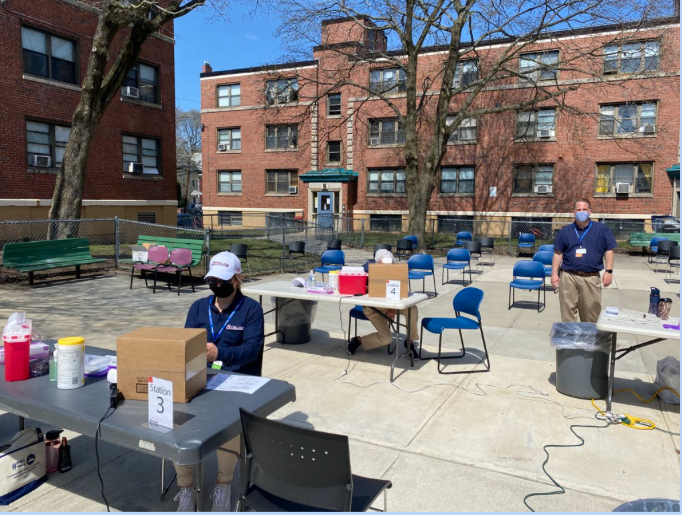By Stephanie Schorow for the Global Mass Vaccination Collaborative
At the start of the rollout of the vaccines for COVID-19, a challenging gap emerged. While a safe, effective vaccine represented a significant medical breakthrough, the United States and other countries had limited infrastructure to get shots into arms quickly.
Ariadne Labs responded to this need for follow-through innovation by launching the Global Mass Vaccination Site Collaborative in April of 2021. The Collaborative’s goal was to create a space for those involved in vaccination efforts to share knowledge and learnings in real time and empower health officials scrambling to vaccinate a global population as rapidly as possible.
The effort turned out to be a lesson in how quickly the demands of a global pandemic can shift. What remains particularly striking about the collaborative’s 13-month trajectory is how the ever-evolving nature of the pandemic required collaborative members to be nimble and flexible in unprecedented ways, continually shifting the focus of the collaborative effort.
Bringing together a host of stakeholders
The collaborative brought together, in regular online webinars, regional and local health officials operating mass vaccination sites, hospitals, representation from public and private organizations, non-governmental organizations, and federal agencies, primarily in the United States. More than 30 organizations from around the United States sent representatives and/or made presentations at webinars.
In November of 2021, with support from the Bill & Melinda Gates Foundation, Ariadne Labs joined forces with the Sabin Vaccine Institute’s Boost Community to extend the reach of the collaborative to more low- and middle-income countries, with an emphasis on sub-Saharan Africa.
Over 13 months more than 35 webinars were held, attracting over 1,000 participants from throughout the United States, India, South America, and Africa.
The collaborative concluded its regular webinars in May 2022, and Ariadne researchers and partners are using learnings to create guidance and playbooks for future pandemics, underscoring the lab’s mission to support innovation and ensure follow through on those innovations.
“The group was a wonderful sounding board – to celebrate accomplishments, sometimes commiserate on the hard challenges,” said Becky Fox, Vice President, chief nursing informatics officer at Atrium Health. “But most importantly, we collectively (and creatively) collaborated and shared ideas/lessons learned to help make a difference – and know that we were all making contributions that would improve the health and lives of many around the world.”
Adapting to the ever-shifting pandemic
As the pandemic evolved, so did the focus of the collaborative. “ Our vision was to build a community to help each other with day to day challenges of vaccine deployment ,” said Collaborative Principal Investigator Eric Goralnick, MD, MS, Medical Director for Access and Network Development at Brigham and Women’s Hospital, an Associate Professor of Emergency Medicine at Harvard Medical School, and Ariadne Labs Associate Faculty. “ We scaled from the US to several lower middle income countries and were able to facilitate open, honest discussions to help each other succeed. Many front line leaders found our collaborative invaluable.”
Initially, webinars concentrated on meeting the overwhelming public demand for vaccinations. Speakers described launching mass vaccination efforts in football stadiums, convention centers, and racetracks. Partners shared techniques for traffic patterns, dealing with weather, assistance for the elderly, keeping vaccines cold, and ensuring enough supplies. A March 26, 2021, webinar, for example, described the mass vaccination effort at Nissan Stadium in Nashville, Tennessee. In one day on March 20, over 10,000 people were vaccinated. At the Charlotte Motor Speedway and Bank of America Stadium in early April of 2021, 36,000 vaccines were administered in less than 10 days.

As vaccination rates in the United States began to wane later in 2021, the webinars began to zero in on strategies for coping with these lags due to lack of access or hesitancy. Speakers explored how to encourage vaccination with everything from creative publicity and “guest” treatment to free beer. Logistical considerations shifted from how to get people to vaccination centers to creating outreach and mobile endeavors to reach people where they are. Speakers from the College of the Holy Cross in Worcester, Mass., reported on their largely successful effort with competition and other incentives to get a 90 percent vaccination rate on the college campus.
Mass vaccination efforts in Wisconsin by the Green Bay Public Health, the Green Bay Packers organization, and Bellin Health at Lambeau Field were influenced by the “guest” approach webinar Boston, Randy Van Straten of Bellin Health told the collaborative. “You took it from Friday and implemented on Monday,” observed Goralnick.
Then came the emergence of the Delta and the Omicron variants, the need for booster shots, and newly approved shots for pre-teens. Burnout among health workers and clinicians and racial and economic disparities in vaccine distribution became pressing issues.
“We tried to keep up with the ever changing landscape of vaccination as we learned more about the coronavirus, its variants and its impact on certain populations,” said Margaret Ben-Or, assistant director of strategic projects at Ariadne Labs. “We often joked that we were building the plane while flying it.”
A variety of lessons learned
From attending collaborative meetings, Fox said she learned to not sweat the small stuff. “Perspective and the ability to step back for a moment can be key to keeping everyone focused on the mission. You don’t have to be perfect, you have to be directionally correct, and make better decisions as you get better information,” she said.
The collaborative later zeroed in on presentations on efforts in Brazil, Haiti, South Sudan, and India. Members probed the reasons why some populations were more reluctant than others to get vaccinations and how that could be addressed. They learned that what worked in one region or country might or might not work in another.
“I think we were also to learn that ideas we thought wouldn’t be applicable outside of a particular context turned out to resonate,” said Ben-Or. For example, the practice of giving a free beer with a vaccination shot proved effective in the United States but seemed unlikely to be effective in low- and middle-income countries. “But it turned out that Uganda’s brewers’ associations were part of the vaccination effort because they had a stake in getting people vaccinated since bars and restaurants were shut down while cases were high.”
It was the most meaningful and the most important work I’ve ever done in my life and something that changed how I look at health care challenges today.
Becky Fox, Vice President, chief nursing informatics officer at Atrium Health
With the new Boost partnership in late 2021, meetings began to focus on mass vaccination methods in low- and middle-income countries, from immunization clinics at marketplaces and mosques in Northern Ghana to site selection in Côte d’Ivoire and techniques for welcoming people to sites in Kinshasa, Democratic Republic of Congo.
By the final meeting in May 2022, the collaborative had launched a multi-faceted website with resources, avenues for community building, and links to an ongoing blog series on the webinars, each with a list of takeaway points, accompanied by videos of webinars in both English and French.
The clear message that came out of the process is that the collaborative should leverage our mission and advance it, not just for COVID-19 but other vaccination efforts, Goralnick said.“It was the most meaningful and the most important work I’ve ever done in my life and something that changed how I look at health care challenges today,” Fox said. “If we can plan and distribute 16,000 vaccines at our first mass vaccination event in less than seven days in Charlotte, N.C., I’m confident that there is nothing we can’t do to make an impact on the world.”




